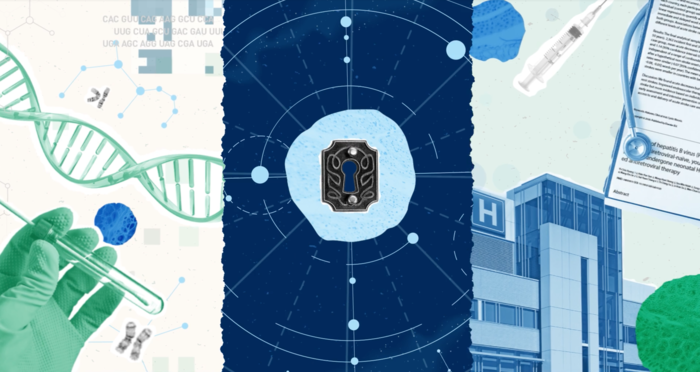
Scaling Octant’s Approach to Drug Discovery
Scaling Octant’s Approach to Drug Discovery
We started Octant with the belief that the most significant challenge in drug discovery is deciphering the immense complexity of human disease biology. The convergence of synthetic biology, chemistry, and computation gave us hope that it was finally possible to scale empirical approaches to navigate this complexity in rational ways. Over the last several years, we have built a next-generation therapeutics platform to do just that. During 2021, our platform hit several key milestones, proving that it is capable of generating multi-targeted small molecules against complex target profiles showing early effectiveness in important disease areas.
Announcing Some Company Milestones
Today we are announcing some important waypoints on our voyage. We are excited and thankful for new funding to push our first programs towards the clinic, and show that the Octant platform can be repeatedly applied in disease after disease. Catalio Capital Management led our Series B fundraise of $80M, bringing our total capital raised to date to $115M. We initially met with Catalio because we were impressed by the roster of cutting edge biotech companies they have partnered with, and the incredible venture partners they’ve assembled in support of their mission. We’re thrilled to work with Catalio on the next stage of Octant.
Bristol Myers Squibb was also a major investor in this round, and we’re humbled to also have the support of so many of our key investors to date, including Andreessen Horowitz, 50 Years, and Allen & Company. Although not tied to their investment, we also recently initiated an important collaboration with Bristol Myers Squibb. We’ve been fans of Robert Plenge’s work for a long time, and share his vision for what’s possible with genetic dose response curves. After spending some time with the Bristol Myers Squibb team talking about the future of drug discovery, we’re excited to be working together on applying deep mutational scanning approaches to a set of inflammation-related target pathways.
.jpeg)
We’re also announcing today that we’ve added two more amazing people to our executive and advisory teams. Dean “Rick” Artis is joining us as our first Chief Scientific Officer. Rick is a seasoned executive across computational and structure-based drug design, medicinal chemistry and early clinical development efforts. He’s had a wide range of experiences during his time at Syntex, Genentech, Plexxikon, Elan, and most recently, Annexon. In addition, Prof. Feng Zhang will be joining our Scientific Advisory Board. Feng has established himself over the past decade as one of the most creative and foundational leaders in mammalian synthetic biology and its approaches to drug discovery. He’s been a principal in inventing and establishing optogenetic approaches in neuroscience and many foundational genome engineering technologies such as TALENs and CRISPR.
The Octant Approach
While these milestones represent some measure of progress, there is so much more to do. We’ve been hard at work engineering synthetic biology, chemistry, and computation to build small-molecule drugs against complex therapeutic challenges. We are working on these problems by scaling the empirical exploration of biochemical mechanisms and cellular pathways to comprehensively map their disease causality, because it’s ultimately those mechanisms that we have to build new drugs towards.

We call this approach ‘Cellular Intelligence.’ Why try to computationally simulate or infer the staggeringly complex inner workings of human cells, when you can engineer the chemistry and cellular models to reveal their secrets directly to us? We engineer cells into systems where we can manipulate millions of inputs across their environment, genetics, and chemical inputs, and harvest millions of outputs through the use of genomically barcoded reporters that tell us the internal ongoings of the biochemical pathways within the cells.
At the heart of the Octant approach is the multiplexed barcoded assay. It enables us to pool millions of unique cell lines in consistent controlled experiments. Our platform consists of a biology engine in concert with a chemistry engine, all powerfully controlled, analyzed, and optimized with sophisticated computational approaches and infrastructure.
Our biology engine enables us to design, build, and test millions of custom cell lines, each precisely engineered to measure the various biochemical activities of drug targets. We run experiments against these cells in our Multiplexed Assay Platform (“MAP”), generating large chemical and biological datasets.
Our chemistry engine harnesses nanomole-scale chemical synthesis to enable us to functionalize custom-designed chemical cores with tens of thousands of chemical fragments. This enables us to rapidly explore and elaborate very large but targeted chemical spaces in order to probe the nuances of how drugs affect cellular responses.
Scaling either side of the platform contributes network effects that increase the rate at which we can unlock human genetic and clinical datasets, and build the next generation of drugs to treat important diseases.
The Octant Platform Unlocks New Therapeutic Approaches
We focus the Octant platform on building small molecules that target multiple receptors, pathways, and/or mutations in disease areas where such approaches are fundamental. Such multi-parameter target profiles are traditionally difficult to define, let alone build a molecule towards. This is where the Octant platform confers unique insights and advantages.

We apply the approach in therapeutic areas with multiple indications that share common causal mechanisms, enabling repeatable intervention strategies for a wide range of diseases. We use the biology engine to first identify the multi-parameter target profiles we wish to build drugs towards, and the chemistry engine to rapidly explore chemical space to home in on these complex profiles. The ability to do large-scale synthetic chemistry in concert with synthetic biology will enable many strategies over time where building complex small molecules is paramount. It is clear to us that the Octant Platform will be limited only by our ability to scale to the challenge.
To date we have focused most of our efforts on two therapeutic approaches:
Molecular Chaperones for the Treatment of Mistrafficking Mutations. Most rare diseases are caused by inherited mutations that result in the loss of function of a single gene. However, different mutations can cause loss of function via different mechanisms. One of the most common is missense mutations that prevent a protein from getting to the right place. Such mutations can be corrected by small molecule “chaperones” that rescue subcellular trafficking, restoring function (for example, Vertex’s Trifakta for treatment of CFTR mutations in cystic fibrosis). Our platform enables a full-stack genetically-validated novel approach to this problem. It enables us to identify mistrafficking mutations against many such severe rare diseases, and to build molecules that rescue significant portions of those mutations. While we can’t treat every patient that suffers from such diseases, we will be able to more precisely identify which patients will and won’t benefit from the particular chaperone in order to treat substantial portions of them.
Polypharmacology and Signaling Bias in GPCRs. The G-Protein Coupled Receptor (“GPCRs”) is the workhorse of cellular signaling. They comprise the most lucrative, and perhaps most important, class of drug targets thus far in human history (roughly one third of all approved drugs, and half of all prescriptions written). Almost all of these drugs exhibit complex activity across multiple receptors (polypharmacology) and selective signaling among the downstream pathways of individual receptors (signaling bias) – the human population is being treated with an armada of drugs we barely understand, most of which were discovered by accident. We are focusing the Octant Platform on bringing more systemic rationality to this space. We use past drugs and genetics to identify the suite of targets and pathways we want to hit, and then use our high-throughput chemistry platform to tune small molecules to hit these multi-parameter target profiles.
Seeking Brighter Horizons

There is a new age of programmable biology and chemistry upon us, and we are focusing it on some of society’s most pressing therapeutic needs. Success will require rational approaches to identify the complex target profiles that modulate disease states, and to engineer drugs as complex as those diseases they are trying to treat. The Octant platform is a bet on that future – we are now more motivated to bring forward this future than we’ve ever been.

Ramsey

